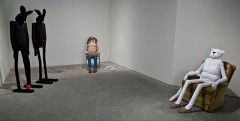Fiction — November 17, 2014 12:28 — 0 Comments
One Super Important Question For Corinne Manning
The James Franco Review is the newest literary publication out of Seattle – the mission of it is simple: treat every submission as if it was from James Franco, i.e. a celebrity lauded for creative work by many. “This isn’t about satire,” says the review’s Facebook page. “This is about visibility. JFR considers your work of prose & poetry assuming it’s already worthy of an editor’s attention.” What a fun, great idea! As a result, we wanted to reach out to the review’s founder, Corinne Manning, and ask her one super important question!
Jake Uitti:Â What do you hope The James Franco Review will do for creative work that other literary outlets don’t – and how does James Franco fit in?
Corinne Manning: My hope is that the difference will start way back at that terrifying and holy moment when artists are making the decision to submit their work. The anonymity, that idea of being worthy like we imagine James Franco gets to feel creates a lot of power. The current fiction editor put it this way: “Instead of being some woman, willing yourself to stay focused for a few hours before or after your job each day, you can just skip ahead and be James Franco.”  But it’s really not about being him; with The JF Review writers can trust that they are getting a very intent and careful read and though each editor is choosing purely based on their taste, they are told to be especially mindful about narratives and poems they don’t always get to see: of queer, of people of color, of working class. The roving cast of editors is going to be key to this diversity, by not having one fiction editor that reads all year it keeps the journal from revealing only the taste of one person on and on into eternity, or the tastes of an editor as filtered through slush pile readers, which we don’t have. My desire for all of this, beyond The James Franco Review, and beyond James Franco himself, is that the publishing industry might hold a mirror up to themselves and reveal that previous/current methods are antiquated, and hold too much back. Imagine how much more rich our experience will get to be as readers when we have access to more narratives and the chance for our brains to expand towards wanting those narratives.
That probably sounds naïve to some, or like utopia, but I’m in favor of the energy behind desiring utopias. Jose Esteban Munoz, a theorist far smarter than I, put it this way: “We must strive in the face of the here and now’s totalizing rendering of reality, to think and feel a then and there.†Utopia allows us to see something strange, something queer, something beyond what we are supposed to want. Utopia offers us a chance to critique a present that continually asks us to desire less. My hope? That we all start to desire more of literature.
The answer isn't poetry, but rather language
- Richard Kenney



